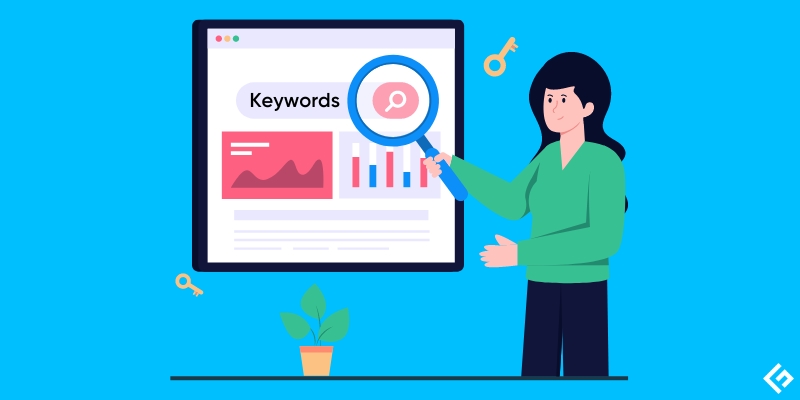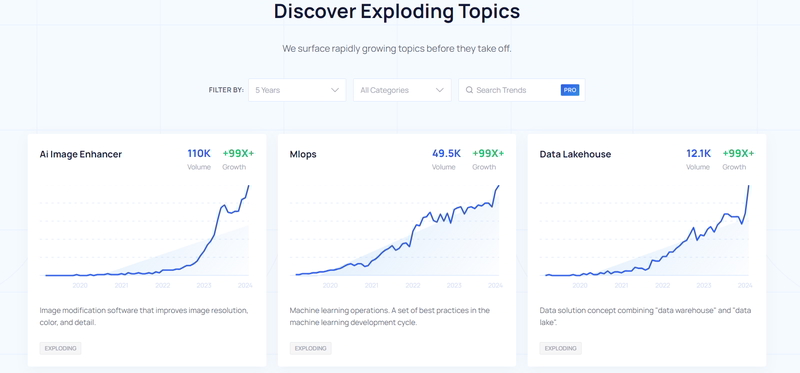B2B SEO involves strategic planning and execution to ensure your business website maintains a high search engine ranking. With so much competition in the B2B space, it can be challenging to stand out and reach your target audience effectively. But fear not; there are unique ways you can strengthen your B2B SEO strategy and set you apart from your competitors.
I am here to help you strengthen your B2B SEO strategy using unconventional methods, such as staying updated on industry trends, understanding keyword semantics, optimizing for voice search, creating unique content, etc., to achieve success in the digital landscape.
What is a B2B SEO Strategy?
A B2B SEO strategy is a marketing approach that focuses on optimizing a company’s online presence to improve brand visibility, organic search rankings, keyword rankings, and lead generation in the B2B sector. This approach involves tailoring content and keywords to attract authoritative people who make decisions in a business.
Unlike the B2C SEO strategy, where efforts are curated to target audiences at a mass scale, the B2B SEO strategy is extremely precise and focuses on targets it directly wants to convert. Although the SEO practices are the same for both, the different natures of the audience impact the way the strategy is executed.
B2B SEO vs. B2C SEO
When it comes to SEO, there are different strategies that are used for B2B compared to B2C companies. Both types of SEO have their own unique challenges and approaches, so it’s important to understand the differences between the two.
B2B buyers are generally more knowledgeable and have complex decision-making processes. This means the SEO strategy needs to be precise to directly address their pain points, and the business should have authority and expert knowledge that they can trust.
The following are the key differences between B2B SEO and B2C SEO:
| Aspect | B2B SEO | B2C SEO |
|---|---|---|
| Target Audience | Businesses and professionals | Individual consumers |
| Purchase Decision | Longer and more complex buying process | Shorter and more impulsive buying decisions |
| Keyword Focus | Industry keywords and technical terms | Consumer-oriented and popular keywords |
| Content Depth | In-depth and informative content | Simplified and easily digestible content |
| Types of Content | Whitepapers, case studies, in-depth blog posts, and technical guides | Engaging blog posts, guest posts, video content, and social media posts |
| Conversion Goals | Lead generation and nurturing | Direct sales and repeat purchases |
| Conversion Funnel | Focuses on multiple touchpoints and leads nurturing | Emphasizes immediate conversions and quick purchases |
| Marketing Channels | LinkedIn, industry forums, email marketing, performance marketing | Social media platforms, PPC ads, digital marketing |
| Traffic Sources | Organic search, referrals | Organic search, social media |
| Link Building | Establishing industry authority and partnerships | Building a strong online brand presence |
| Technical SEO Focus | Website structure, user experience, technical SEO audits, and mobile optimization | Website speed, responsive design, technical SEO audits, and user experience |
| Analytics and Metrics | ROI, lead generation, and customer lifetime value | Conversion rate, click-through rate, and bounce rate |
| Competitive Landscape | Focused on targeting specific niche industries | Highly competitive and diverse market |
Below, I’ve listed unique and actionable B2B SEO strategies that you can apply for your digital business.
Understand Keyword Semantics
Just finding related long-tail keywords isn’t enough. You need to understand the search intent of the customer or buyer persona and create content around it. A reliable way to find out intentions is to know the exact phrases people use to search for related keywords.
For example, for a business offering industrial automation solutions, “IoT integration for factories” is a good keyword for creating content. Further digging reveals that people who search for IoT integration are also searching for “How is industrial IoT different from IoT?”. So, a business can create content around it to attract potential corporate customers.

Knowing the complete phrase will help you understand the customers’ intentions, but finding those phrases can be a bit tricky. What I like to do is search my keyword on KeywordTool and then click on the “Questions” section at the top to see all the questions being asked about it. The questions are usually long phrases, showing the intentions of the potential customers.
Alternatively, you can also get help from an AI keyword research tool like Keyword Insights.
Another option is AI Keyword Tool by Ryan Robinson which has an “Ideas” section where you can get phrases related to your keyword that show the intention of the people. By using keyword search tools, try to incorporate these keywords into your website content, including titles, headings, and meta descriptions.
Add Localized Landing Pages
If a B2B company sells software or its products can be delivered internationally, localized landing pages can significantly improve B2B SEO. Businesses are more likely to trust a local brand that they can relate to. Additionally, targeting local keywords can help attract more users.

A localized landing page has content specifically optimized for users of a specific area. This content includes local language, localized information, and local keywords relevant to the B2B buyers in that region. The local landing pages will also have improved visibility in SERPs as search engines prioritize local solutions for most queries.
Local landing pages can be easily used by identifying the specific locations where your product/service has the highest potential for success and creating a new landing page with content that is relevant to them. Afterward, you can use a geo-targeting plugin/app to redirect users to the local landing page.
WordPress users can use the GeoTargeting Lite plugin, and Shopify B2B stores can use the Advanced Store Localization app.
AI Personalization for Search and Recommendation
Using artificial intelligence (AI) personalization tools, you can offer a personalized product search and recommendation experience to generate leads. The AI tools can recommend products based on user behavior, demographics, past interactions, and other indicators to ensure customers get the products they need easily.

For SEO, they mainly boost user engagement and increase the checkout rate. However, they also have long-term SEO benefits, as users are more likely to visit again to easily find what they need.
Dynamic yield and Nosto are some of the best AI tools for this purpose. They can track user activity to offer personalized search results, product recommendations, dynamic bundles, upsell/cross-sell opportunities, and engage customers at critical times.
Predict Future Industry Trends
To present yourself as the thought leader in the industry, you need to predict future trends in your industry. This will not only allow you to incorporate the new trend in your business model but also create content around it to present yourself as the authority in the industry.

To specifically talk about SEO benefits, there are many, and below are the most prominent ones:
- Early ranking advantage on competitive keywords before they become competitive.
- Increases business authority and credibility in the eyes of both potential clients and search engines.
- Generates backlinks from sources that depend on your content to talk about the new trends with their audience.
- Sparks conversations within the industry about your brand that can positively impact SEO.
- Helps capture leads by solving customers’ upcoming pain points by offering solutions before the competitors.
- Search engines prioritize fresh and unique content that stands out from repetitive content.
There are many ways to keep up with the latest trends, but you need to keep up with the latest happenings in the industry and related trends. You can access insights from research data firms, analyze historical data to predict future changes and track emerging technologies (AI, VR, AR, Blockchain, etc.). Social listening can also be a good way to learn about emerging trends and customer pain points.
Along with keeping up with the latest insights, you can use trend-finding tools as well. Tools like Google Trends or Exploding Topics can help you find trending topics related to your booming industry.
Optimize for Voice Search
By optimizing your content for voice search, you can reach a wider audience. Business professional may start their initial search using a simple voice search on the phone. So you can attract their attention right from the start.

There is no way to determine which searches are voice searches or typed out directly. It is important to consider how people may naturally phrase their searches when using a voice assistant, as it may differ from typed searches.
For example, for the keyword “Best HR software”, a typical voice search could be “recommend me a user-friendly HR platform for my startup” or “suggest an HR software with payroll integration for my growing company”.
You can also take advantage of the “Questions” section of KeywordTool.io, as I have mentioned above, to see phrases that could indicate natural language used for voice search.
Voice assistants often read up to 29 words of a search, so it’s best to keep your answers short and precise for optimum results. I recommend you create an FAQ page at the end of your content where you can answer voice search queries. An FAQ section will let you naturally add the question exactly as searched and give a short answer without looking unnatural.
It is worth adding that voice searches are mainly done on a mobile device. If you have a well-optimized mobile website, then targeting voice searches will also improve mobile rankings.
Industry Collaboration
Collaborating with non-competitor brands in your industry or related industries can be beneficial for both parties. This collaboration goes beyond networking and involves working together to improve SEO, brand awareness, and lead-generation strategies.
Additionally, collaborating with reputable industry players can help you reach a larger audience and drive more traffic to your site. Overall, this collaboration can significantly boost your B2B SEO efforts.

Below, I am listing some common types of collaborations businesses can do to improve B2B SEO:
- Guest blogging: You can contribute expert articles on non-competitor blogs to gain backlinks and access their audience.
- Collaborate on new content: You can share expertise to create new content like ebooks, white papers, infographics, etc., and then promote it together.
- Hold roundups or interviews: Collaborate with experts by featuring them in interviews, blog posts, webinars, or podcasts to share knowledge and promote the brand.
- Cross-promotion on social media: Promote each other’s content and important events on social media.
- Share data: Share and create content on industry data that is exclusively available to each collaborator. This will provide valuable data to the audience and boost engagement.
Create Unconventional Content
Creating unconventional content means going beyond regular text or video content to capture the attention of the audience by being unique. By incorporating interactive or humorous content, you can increase user engagement, attract backlinks, improve social shares, boost brand authority and awareness, and generate more leads through interactive features.

Now, what kind of unconventional content is best for you depends on your business nature. Below, I am listing some ideas worth exploring:
- Interactive quizzes and polls: Industry-specific quizzes or polls can be used to educate users and increase engagement.
- Choose-your-own-story games: Let users solve problems and go through a story with endings leading to your product/services.
- Industry-specific memes and GIFs: A well-executed meme or GIF campaign with industry-specific humor can resonate with professionals and potentially increase repeat visits, as some jokes may require industry knowledge to be fully appreciated.
- Incorporate Augmented Reality: You can overlay your products and services onto real-world environments for customers to see how they will apply to their business.
- Livestream Q&A: You can hold livestream Q&A sessions to directly interact with your audience and share expert knowledge.
- Host AMAs: An AMA (Ask Me Anything) is great for engagement. You can show your expertise to your audience and link your website for traffic. It can be a live stream or even on a platform like Reddit.
Bonus: Build a B2B Community Platform
Creating a forum or discussion board on your website can offer a valuable platform for interacting with your target audience, sharing knowledge, and engaging with your brand. This will enhance your overall presence in the industry and establish customer trust. Additionally, you can utilize user-generated content for SEO purposes.

A B2B Community Platform allows for discussions on industry challenges and trends, expert insights, and event hosting. However, it should be noted that this requires a significant amount of effort and may not be suitable for everyone.
B2B SEO Strategy: Maximizing Digital Presence
Implementing an effective B2B search engine optimization strategy is important for B2B companies to succeed online. This involves staying updated on industry trends, understanding keyword semantics, optimizing for voice search, and creating unique content to improve visibility, attract more traffic, and generate leads and sales.
Consider investing in a B2B SEO agency or partnering with experienced professionals in your industry to gain access to exclusive analysis. This will allow you to provide exclusive content to customers to create authority.

